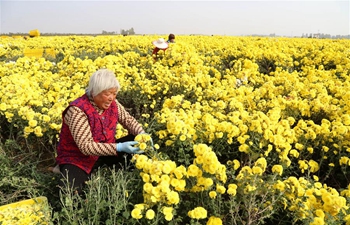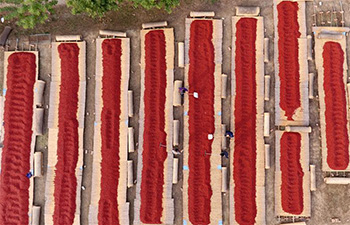URUMQI, Nov. 5 (Xinhua) -- Ehmetniyaz Zakir, 63, rolls a sewing machine wheel with one hand, and presses a piece of cloth with the other. In a few minutes a delicate yellow flower is stitched, to the delight of his watching apprentice.
Ehmetniyaz Zakir, from a small village in the southern part of northwest China's Xinjiang Uygur Autonomous Region, has been a tailor for 40 years. Now he has a new life working in a clothing factory.
The workshop in Lop County at the edge of Taklimakan Desert is in the most impoverished part of Hotan prefecture.
Factories have appeared in the area with financial support from other provinces to help lift local Uygur like Ehmetniyaz Zakir out of poverty.
Ehmetniyaz Zakir learned to sew at the age of 10. When he was 20, his family exchanged a sheep and a cow for a sewing machine.
His sewing brought him fame in the poor area and fortune for the entire family.
"Almost everyone went to a tailor for new clothes, usually ahead of holidays," he recalls.
However, the situation deteriorated as people got richer. With more disposable income they started buying ready-to-wear clothes.
In 2011, a railway line connected the isolated area to the outside world and the tailoring job that had made Ehmetniyaz Zakir so proud for so many years failed to bring in enough money. An annual income of less than 5,000 yuan (754 U.S. dollars) could barely feed the family of seven.
Not until the clothes factory opened did the elderly tailor feel he was needed again, and he decided to become one of few male and few elderly workers in the factory.
"I don't want to be a burden on my family," he says. His heart surgery last year cost nearly 10,000 yuan.
His daughter and daughter-in-law, who worry about his health, have followed him into the factory and together they now bring home around 120,000 yuan a year.
"It's more stable than working in cities," said Rabi Mehmut, his daughter.
Unlike eastern coastal regions where factories face shortages of workers, Hotan Prefecture has a 600,000-strong surplus work force with few opportunities for them.
Since 2011, 19 provinces and municipalities have helped to construct factories to attract businesses from eastern regions.
Zhi Xianwei, a Beijing official in charge of aid for Hotan, said Beijing had built standard factory buildings of 273,000 square meters in the prefecture, drawing 62 companies and creating 37,000 jobs.
More than 1 million jobs have been created since the government began support for Xinjiang's less developed Hotan and Kashgar prefectures, and they are local jobs for a large number of previously impoverished farmers from ethnic minority groups.
Shu Weipeng, owner of the factory where Ehmetniyaz Zakir works, says the preferential tax policy and ready-built workshops attracted him. Optimistic about business prospects, Shu plans to expand production and double the payroll to 1,000 within five years.
Rabi Mehmut has a plan, too.
"I'll work hard and learn the skills that my father passes on to me, and open a small workshop myself some day," she says with a smile.

















